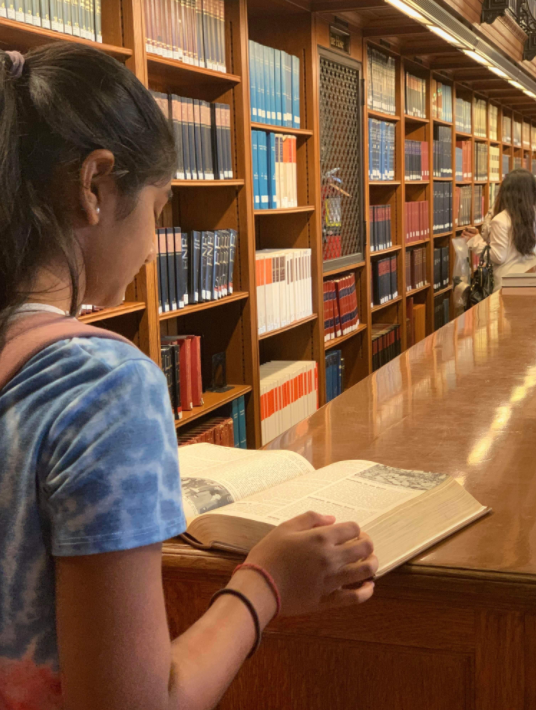Turning pages: Changing perspectives through reading
Students detail their experiences with reading during quarantine along with the effects reading has on their overall perspectives
Gupta reads a large novel in an organized library. (Photo by Gupta’s Father // Used with permission)
October 12, 2020
Sophomore Tvisha Gupta says she has been in love with books since she was 1 year old. Some of her earliest memories include forcing her parents to go to the library to find new books to read to her. This passion for reading has helped her through difficult situations as she says books provided her comfort when people couldn’t.
“When I first moved [to the U.S.], I was very, very lonely,” Gupta said. “So the only thing that actually helped [to] keep me going was books. I was going through 11 to 12 novels a week and that’s a lot for me, actually, even more than I read now. Reading books has definitely increased my English knowledge [and] my vocab … but it’s also given me a friend when I didn’t have one. That’s definitely a reason that books are very special to me.”
Gupta also finds that reading has improved her stay-at-home experience as she says it acts as a reprieve from the monotony of everyday life.
“[Reading] made quarantine less boring because at first it was get up, go to school, do homework, chill, cry about life and then go to bed, so it was definitely a change in the mood, especially at the beginning when I had not much to do,” Gupta said. “The different types of books, especially for my favorite genre, thrillers, it’s much more interesting.”
Senior Pranav Reddy relates to reading being able to appease the boredom of staying at home. However, he feels that it was unable to help with one of the larger issues he faced during quarantine.
“I wouldn’t say it especially benefited my quarantine life,” Reddy said. “[One] thing that I was really lacking in quarantine was social interaction and reading only alleviates the boredom aspect — it’s a very solitary activity. I think it helped to a small degree, but I wouldn’t say it’s a special quarantine activity.”
Over the summer, Reddy says he read for hours at a time, but his hours of reading for pleasure diminished greatly as school started. Sophomore Catherine Liu agrees with Reddy and finds that her reading habits have changed with the start of distance learning.
“I think before [quarantine], I used to be able to read through without stopping, and now I’m kind of breaking it up,” Liu said. “It’s harder for me to really stay focused because I’m always thinking about other things now in quarantine, especially now that school has started. I start reading and … have to read things over again.”
Although Reddy’s reading time has declined, the books that he read over the summer still leave a lasting impression on him. He was able to read Ibram X. Kendi’s book, “Stamped from the Beginning,” and found that it was a very timely read in relation to the Black Lives Matter movement. While he was able to educate himself on the current issues in society, he realized that many other individuals were not doing so.
“I’m kind of surprised at how much people don’t read things outside of social media and rely a lot on social media, especially for nonfiction,” Reddy said. “I read ‘Stamped from the Beginning’ because I thought of current events and that it’s important to get some perspective, so I was also kind of surprised at how many people just did not do any reading.”
Gupta also began to educate herself in terms of the Black Lives Matter movement through reading “Dear Martin” by Nic Stone, which details the life of a Black student who was accepted into a prestigious college despite facing prejudice.
“[‘Dear Martin’] definitely changed my perspective because I wasn’t very well-educated on the movement at all,” Gupta said. “And then upon reading [it], I could definitely grasp the concepts of the movement more.”
Similarly to Gupta, Liu finds that books can broaden her worldview. By reading “Lord of the Flies” in her sophomore World Core class, she realized that her views on “how people think” and “what people would do if they’re left alone” changed.
Reddy agrees with Liu’s idea that books are able to change one’s views on certain topics; however, he is unable to see the effect on his overall life.
“I don’t know if the [books] have made any noticeable impact,” Reddy said. “There’s nothing for me to compare it to. I can’t compare it to a life where I haven’t read [the books]. But I definitely think that they made me think about things, think of the books and think more critically about the things that I read and consume, and also find it as a good pastime.”
Although Reddy sees that reading makes him more informed, he can also acknowledge the possibilities of becoming overconfident in one’s intellectual ability as a result of reading consistently.
“Don’t assume that you’re automatically more informed or more particularly educated just because you read literature,” Reddy said. “There’s nothing inherently superior about literature. I think it’s just a lot of literature that goes through much more verification than other mediums.”
Overall however, he finds reading to be enjoyable, as he is able to experience what he normally can’t through the author’s words. Liu and Gupta also feel this way and see literature as a way to put themselves in a new world and feel what the characters in that world feel.
“[Reading] just makes you feel something — it can distract you, really fully distract you from your own life, and you can imagine all kinds of things that you would never otherwise experience,” Liu said. “I feel like books always impact me, at least deeper than movies … and it can really change my perspective on things.”


















